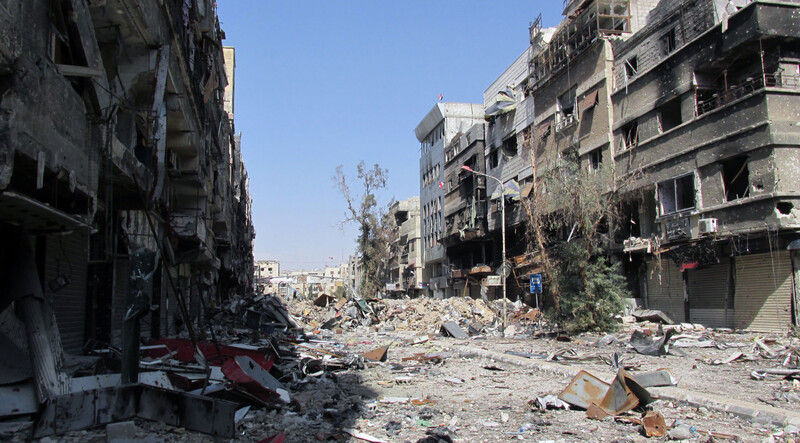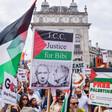Rights and Accountability 27 July 2015

A 2014 UNRWA photo of Yarmouk camp.
The situation in Yarmouk hasn’t improved much since April, when United Nations chief Ban Ki-moon described it as the “deepest circle of hell” in war-ravaged Syria.
But Ban’s report to the Security Council on Syria, issued in late June, omits the thousands of civilians who remain in the camp south of Damascus in its population count of besieged areas.
This was overlooked until the humanitarian news agency IRIN exposed the change in Yarmouk’s status last week, triggering incredulous reactions on social media.
The advocacy group Palestinian League for Human Rights-Syria called on OCHA, the UN body that advised Ban to change Yarmouk’s status, to detail its reasoning “given [that] the situation on the ground contradicts it.”
The reasoning implied in the secretary-general’s report is that UNRWA, the UN agency for Palestine refugees, has been able to deliver assistance to refugees who fled Yarmouk to three nearby suburbs.
Camp cut off
But as IRIN reports, even access to those areas has been cut off since 8 June. UNRWA has not had direct access to Yarmouk since late March.
UNRWA was forced to suspend aid distribution in the camp after the entry of Islamic State — the militia also known as ISIS or ISIL — in early April.
There were an estimated 18,000 civilians in the camp at that time, including 3,500 children, and many of them fled to nearby areas as armed groups fought in the camp and Syrian government forces bombed indiscriminately.
Yarmouk was once home to 150,000 Palestinian refugees and Syrian nationals but most residents fled in late 2012 after rebel forces entered the camp, including al-Qaida’s branch in Syria, Jabhat al-Nusra. The government and allied forces began to prevent access to Yarmouk in July 2013.
Residents have not had reliable electricity since then, as the main supply was cut. There has not been running water in the camp for a year. Dozens have died of hunger and for lack of medical treatment.
Even in the context of Syria — which has triggered the world’s largest humanitarian crisis since the Second World War, according the European Union — the plight of Yarmouk is unique.
Targeting of Palestinians
Nidal Bitari and Wesam Sabaaneh, both born and raised in the camp, gave a comprehensive and sobering overview of the situation of Palestinian refugees in Syria and Yarmouk in particular at the Palestine Center in Washington, DC, last month (video embedded below).
Sabaaneh, the director of the Jafra Foundation for Youth and Development, believed to be the largest Palestinian civil society group in Syria, stated that “the targeting of the Palestinians in Syria is very clear, and it started at the beginning of the Syria conflict.”
Deraa camp, in the area of southern Syria where the mass protests in 2011 first erupted, “was targeted since the beginning,” Sabaaneh said, noting that at the time, Bouthaina Shaaban, an adviser to Syrian President Bashar al-Assad, “claimed that there were Palestinian terrorists in Deraa trying to destroy the country.”
Four years later, several of the Palestinian refugee camps have been depopulated, heavily damaged or remain inaccessible.
“Husseiniya camp and Sbeineh camp [both in Damascus] now have no Palestinians living there; they have been totally evacuated,” Sabaaneh stated.
Bitari explained that before the outbreak of violence, Yarmouk was the capital of Palestinian life in Syria and the wider diaspora. Its residents were highly educated and Yarmouk was a harbor for Palestinian culture after the mass expulsion from the homeland in 1948.
“The headquarters of the Palestinian factions were inside this camp. The main actors, centers and organizations of the Palestinian civil society in diaspora in Syria were inside this camp,” Bitari said.
It is this dynamic civil society that has endeavored to serve the needs of Palestinians in Syria not met by international organizations — but at great risk. Several Jafra volunteers have been killed or imprisoned during the course of the civil war.
Jafra is one of the few entities that operates in both government and opposition-controlled areas.
“In Yarmouk camp we have done the waste management for the last two and a half years; we do the water trucking; also schooling for children who were out of school in the opposition areas and in the IDP [internally displaced persons] shelters. We have around 13,000 children getting education and social support in the Palestinian camps,” Sabaaneh said.
Bitari described how Palestinian refugees displaced from Syria are not given the same status as other people who have fled the country.
Palestinian refugees are under the responsibility of UNRWA, which does not have a protection mandate like the UN’s refugee agency UNHCR.
Lebanon, Jordan and Turkey have closed their doors to Palestinian refugees specifically. And stateless Palestinian refugees who hold only travel documents and not passports have found themselves detained at international airports.
As a result of these conditions, thousands have undertaken the extremely risky journey to Europe via smuggling boats, and many have lost their lives.
Those who cannot afford to pay thousands of dollars to smugglers find themselves with few options besides prostitution, child labor and militia recruitment, Sabaaneh said, adding that his organization tries to provide a viable alternative.
UNRWA crisis
Ninety-five percent of the 480,000 Palestinian refugees in Syria are fully dependent on UNRWA assistance to meet basic food, shelter, health and water and sanitation needs, according to the agency.
Yet UNRWA is facing its “most severe financial crisis ever,” spokesperson Chris Gunness tweeted yesterday.
The body convened an extraordinary session this weekend to “review the growing risk that UNRWA may have to delay the start of the academic year in some 700 schools for half a million students across the Middle East” unless a deficit of $101 million is fully funded before the start of the school year, the agency stated.
UNRWA has already reduced its staff. The UN’s news service reported that “that 85 percent of all 137 international personnel on short term contracts will be separated in a phased process lasting until the end of September.”
“UNRWA is taking this measure to reduce costs as much as possible without reducing services to refugees,” Gunness, the UNRWA spokesperson, said.
During his Palestine Center presentation, Bitari warned of the implications of the obliteration of Palestinian refugee infrastructure in Syria, explaining that UNRWA is “our international proof that we exist.”
“If there are no camps anymore and the international community cuts funds to UNRWA, we will be literally stateless without any proof of our situation or our historical rights as Palestinians being kicked out of our country to be stateless around the world,” he said.
“Imagine that 500,000 Palestinians left Syria to be stateless,” Bitari added. “We are trying to explain to the world that there should be a solution for the Palestinians in Syria.”






Comments
"Stateless"
Permalink Martin O'Brien replied on
This comment is not about semantics. It goes to the black heart of the evil which has taken over the United Nations Organisation, transforming what should be the greatest moral progress ever made by Mankind into a cover for greed and callous inhumanity. The Nakba refugees are not refugees. They are exiles from particular places and neighbourhoods and properties that existed and still - in some form or other - exist within the boundaries of what now is called "Israel". Frequently - perhaps annually - the General Assembly reminds itself that the Nakba exiles have the inalienable right of return and that their right to their property and to the proceeds from the use of their property endures. For this latter point, see for example GA resolutions 49/35 F (December 1994) and 61/115 of January 2007. "Israel" refuses to pay anything. In these circumstances, it is tempting to think that "Israel" is the state of the original Nakba refugees and their descendants. And in a sense it is. The difficulty in reaching this conclusion, however, is that it implies that "Israel" has a legitimacy as a state when the Nakba itself and the Nakba refugees/exiles preclude any legal or moral possibility of such legitimacy. Consider that, when the religious/ethnic Zionist minority in Mandate Palestine, better financed and better armed, massacred, expelled or terrorised into flight most of the non-Jewish majority in the territory it came to control, the Jewish government which ensued was necessarily illegitimate, because it was elected and formed without the participation of the majority of the citizen body entitled to live in that territory and, therefore, to participate in naming it and governing it. Since the Jewish Agency and the first "Israeli" government were elected by a minority of those entitled to vote, they were illegitimate and so were all the decisions, policies and measures which they adopted, including all decisions, policies and measures on immigration. (Continued)